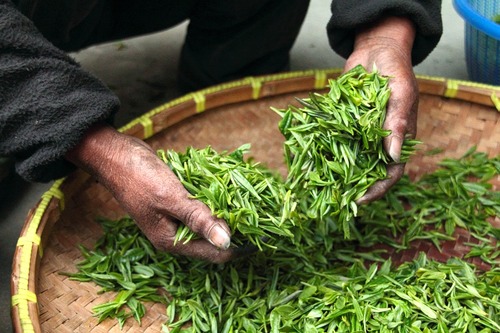Is Too Much Tea Bad For You?
Short answer
Too much tea is potentially deadly. There are several risks associated with overconsumption of tea and a grand total of zero benefits to be had from doing so.
Category 'F' is for things that fail to bring anything beneficial to the table, and are very harmful to your health. We recommend completely avoiding anything in this category. Long-term side effects of 'F' items are usually very serious.
View Full Grading System
Category 'A'
Very healthy and numerous health benefits. Side effects are rare. Things rated an 'A+' are typically necessary for survival (for example, water).
Very healthy and numerous health benefits. A few harmful qualities may be associated, but only under certain circumstances such as an allergic reaction.
Very healthy and numerous health benefits. Harmful qualities may be associated, but aren't usually serious.
It is important to note that even the best things in life can become bad in immoderate amounts. So, although something may be rated an 'A+', overconsumption/overdoing can bring unwanted effects.
Category 'B'
Very beneficial to your health. Things rated a 'B+' may have a few harmful qualities to pay attention to.
Overall beneficial to your health. Things rated a 'B' may have some harmful qualities to pay attention to.
More beneficial to your health than not. However, harmful qualities are most likely associated and shouldn't be overlooked.
The main difference between category 'A' and category 'B' is the harmful qualities typically present in 'B' items. Serious side effects are usually uncommon, but are still possible and should be taken note of.
Category 'C'
Both beneficial and harmful qualities associated. Things rated a 'C+' are typically a bit more on the beneficial side. Still, moderation is important.
A fairly even ratio of beneficial and harmful qualities. Moderation is important. Very general topics that can lean towards both sides of the spectrum will be placed here as well. Rice, for example, can be good or bad depending on the type.
More harmful than beneficial. Side effects are common, especially when consumed/done excessively. Moderation is very important.
Category 'C' usually denotes to both good and bad qualities. When it comes to this category, it is important to keep this word in mind: moderation.
Category 'D'
Harmful to your health. Although benefits may be associated, the bad most likely outweighs the good. Moderation is very important.
Harmful to your health. A few benefits may be associated, but the bad outweighs the good. Moderation is extremely important.
Harmful to your health. Very few, if any, benefits are present. Things in this category should be avoided as much as possible.
Category 'D' is typically for things that are more harmful than beneficial. While consuming/doing something unhealthy once in a blue moon shouldn't hurt, we definitely recommend eliminating 'D' items as a regular part of your routine/diet.
Category 'F'
Category 'F' is for things that fail to bring anything beneficial to the table, and are very harmful to your health. We recommend completely avoiding anything in this category. Long-term side effects of 'F' items are usually very serious.
Category 'N'
'N' stands for neutral. Things placed into this category are generally (a) neither good nor bad for you, or (b) lack the necessary evidence to reach any conclusions.
Long answer
Tea, especially green tea, is known for its many health benefits - in particular, its ability to provide the body with a good source of antioxidants. However, much like alcohol, too much tea causes a loss of benefits, leaving only negative consequences. The first thing to consider is the amount of caffeine. While teas vary in their caffeine content, an excessive amount of caffeine (which, like nicotine, is a nootropic drug) can lead to anxiety, restlessness, insomnia, and in extreme cases - death due to toxicity. Drinking excessive amounts of tea can also bring about a ringing in the ears (tinnitus), nausea (with the risk greatly increased if consumed on an empty stomach), and dry heaving. Furthermore, black tea may make you feel bloated with excessive amounts over a long period of time possibly leading to skeletal fluorosis. Too much green tea, for its part, can complicate symptoms of people suffering from anxiety, hypertension, or stomach ulcers. Some studies also implicate too much green tea with an increased risk of colorectal, lung, and esophageal cancers. One study found that too much hot tea can triple the risk of esophageal cancer in women and another showed that men who drink seven or more cups of tea per day increase their risk of prostate cancer by 50%.
Black tea also contains oxalates and in the case of one lucky individual, too much of the drink can lead to oxalate build-up in the kidneys and cause renal failure. The man survived, by the way, but only due to the life-saving actions of the doctors in the ER. One more thing to beware of is that people who go from strongly fermented to lower/unfermented teas are at greater risk of experiencing negative side effects, as are those who are normally not heavy tea drinkers.
Tea in moderation is quite good for you and has several health benefits. Too much, however, should be avoided. Although the types of tea and their effects of over consumption vary, we recommend staying below four cups per day--with a maximum of five.
Possible short-term side effects
- anxiety
-
restlessness
-
tinnitus
-
impaired iron absorption
Possible long-term side effects
- renal failure
-
skeletal fluorosis
-
cancer
Ingredients to be aware of
Healthier alternatives
- consume tea in moderation
Please turn your Ad Blocker off to see this content. Thank you!
Thank you for your feedback!
Written by Jeff Volling
Published on: 02-12-2016
Last updated: 12-10-2016
Thank you for your feedback!
Written by Jeff Volling
Published on: 02-12-2016
Last updated: 12-10-2016

 Approved by
Approved by 















